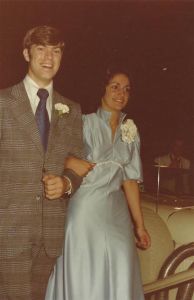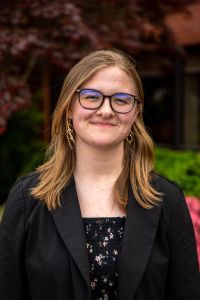Lamar Keener found himself at a crossroads in the summer of 1972, deciding where he was supposed to go to college. He thought he was meant to attend Moody Bible Institute, but after stepping foot on the grounds of Lynchburg Baptist College (LBC), he enrolled, not because it had a grand campus, but because it lacked one and had the potential to grow.
Keener, a Pennsylvania native, has an extensive career in the field of higher education, newspaper publishing, ministry and business management. However, he originally aspired to be a youth pastor and never imagined that he would later become the executive director of the Evangelical Press Association (EPA).
His career journey began on the front steps of Thomas Road Baptist Church when he made the spontaneous decision to attend LBC after visiting one of his brothers.
“I was so blown away by this place (Liberty), despite the fact that it had no campus, that I decided I wanted to go there, and this is literally my thinking, ‘I would rather be a big duck in a small pond than a little duck in a big pond,’” Keener said.
Since LBC did not have a brick-and-mortar campus at the time, all the students were instructed to go to Treasure Island for their dorm assignments. According to Keener, the dorms were based at an old summer camp, and his very first dorm was an old bunkhouse with 15 bunk beds and two bathrooms.
He stayed at the island for one year before moving to the Stewart Arms Hotel, now known as The Virginian, in 1973. He said the hotel had been closed for some time and required extensive cleaning as well as new furniture for students to use. He had a triple bunkbed at the hotel and remained there for three years.
Since the college was spread throughout several locations around Lynchburg, many of the students needed transportation to get to their classes and the chapel services.
“Those early years, they used the green Sunday school buses from Thomas Road Church,” Keener said. “The church had a huge bus ministry. … They used these buses to carry us around Lynchburg.”
The original bus route traveled between Treasure Island, the Stewart Arms Hotel, the Ramada Inn, TRBC, Timberlake Christian School and Ruffner Elementary School. Keener said he attended several classes at various locations and that the students had 30 minutes to find a bus and ride over to the next stop.
“Until 1978 … we were riding those buses all over town,” Keener said. “That’s the way you did it, and … singing songs, and it was actually kind of fun. It really built comradery, and you got to know a lot of people despite the fact that the college was growing so fast, but that was … what we did those years.”
Every day, the bus would travel across an old bridge that could not sustain the weight of a full bus. Keener said every student aboard would have to leave the bus and cross the bridge on foot. Once everyone crossed safely to the other side, the driver would bring the bus over the bridge, and then the students would climb back on and go to the next location.
“So that was life, and we loved it,” Keener said. “We didn’t care; I … know that we knew that we were in the midst of something that was going to be great.”
In his second year of college, Keener joined a music group known as the LBC Chorale. During Keener’s junior year in 1975, the 14 students in the chorale at the time had to stop their studies because the college was severely lacking funds.
Dr. Jerry Falwell’s solution was to have everyone on the LBC Chorale perform at banquets throughout the United States to raise money for the college that year.
“Most of the times we would fly from place to place, and then the bus would catch up and carry us around town,” Keener said. “It was amazing.”

Photo provided
At the crux of his senior year, Keener served as the student body president and became friends with his campaign manager, Theresa Grassel, who would later become his wife.
“She was actually dating my opponent, but she was my campaign manager because she told him she had to support the better candidate, and she … ended up marrying me,” Keener said.
While serving as student body president in 1975, Keener said he created College for a Weekend as a project with the Student Government Association (SGA).
Once he graduated, he traveled as the director of one of the two LBC Chorale road teams for a year to perform in 300 concerts from 1976-77. The road teams were branched off from the LBC Chorale, using students who withdrew from their studies for a full year.
Before Keener became the director, SGA was primarily responsible for organizing events around campus. Once he began serving as director, he worked on organizing concerts for students and changed the entire system for campus activities. He also helped start the Student Alumni Association in 1978 and became the original dean of commuter students.
In 1978, the university officially moved to Liberty Mountain, and it had offices on the ground floor of what used to be known as dorm two.
At the time, students had to be bused to Thomas Road in Lynchburg for chapel because there was no place on campus to hold chapel services. Keener came up with the idea of using a “Gospel tent” for chapel services and presented it to LBC President A.P. Guillermin.
“When I was a kid, I would go to tent meetings up in Pennsylvania, and I said, ‘This tent holds several thousand people,’ so they checked it out, and we were able to rent the tent for six months, and they put that tent right where the DeMoss building is,” Keener said.
Whether in rain or snow, the college continued to use the tent for chapel services and Bible classes.
“I loved it. I loved my time there. … I treasure it forever,” Keener said. “The friends that we have are many.”
Keener received his master’s degree at Liberty Baptist Theological Seminary in 1983, and he then left the area to help start a church in Seattle, Washington. In 1985, he began working at Christian Heritage College, now known as San Diego Christian College. A few years later, Keener and his wife entered a new chapter of their lives by venturing into newspaper publishing.
“We bought a small newspaper, Christian newspaper in San Diego, so it would be 1988, and … we grew that into the largest Christian newspaper network of papers in the U.S.,” Keener said.
Keener called their newspaper business the “Christian Examiner,” and they had several newspapers based in California, Washington and Minnesota.
“Every month we were putting out 175,000 copies, and they were distributed free to churches, thousands of churches all over Southern California and then Seattle, Minneapolis, different places,” Keener said.
Then, Keener and his wife decided to transform their business into a magazine called “Refreshed,” which is also when the couple began working with the Evangelical Press Association.
In 2015, Keener became the executive director of the EPA, and he currently facilitates organizations’ membership with the EPA and leads conventions in the fall and spring. His wife builds the association’s website and manages its digital platforms.
Throughout all his jobs, Keener said the best part has been communicating the gospel to others. Whether it be through direct ministry, higher education or publishing, he is immensely passionate about being a light to others.
Keener said that between the EPA’s print and digital resources, the organization’s members reach 25 million readers.
“To realize that you have that much influence in putting out the gospel in Christian resources (is fulfilling),” Keener said.
Davis is the editor in chief for the Liberty Champion.

